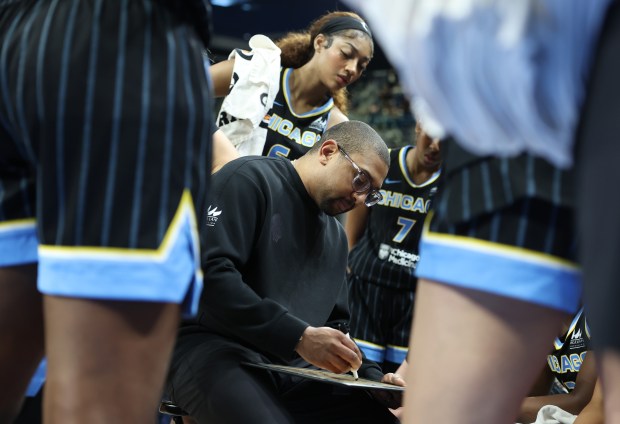President Donald Trump’s refugee policy reminds me of what automaker Henry Ford supposedly said about his company’s Model T: “A customer can have a car painted any color he wants as long as it’s black.”
So it is with the Trump administration’s policy toward refugees who are fleeing war or political persecution, albeit with a color preference somewhat at odds with Ford’s.
The Trump administration is welcoming white Afrikaners, a centuries-old ethnic group descended mainly from Dutch colonists, after suspending the program for everyone else. The first group of almost 60 arrived from South Africa at Dulles International Airport last Monday night — on a charter flight paid for by the U.S. government.
That means all other Africans who have waited in refugee camps for years after being vetted and cleared must step back and wait even longer for their uncertain futures to play out, as white South Africans get ushered through the express lane.
This also throws into limbo the Afghans who risked their lives to assist American combat troops who were unable to leave the country after the Taliban took over. “Betrayal” is a tough word, but it taxes the mind to think of a more appropriate description.
Such was the outrage expressed by the Episcopal Church, which announced after the Afrikaners arrived that it was terminating its partnership with the federal government to resettle refugees.
In a letter sent to members of the church, the Most Rev. Sean Rowe, the presiding bishop, said that two weeks ago, the government “informed Episcopal Migration Ministries that under the terms of our federal grant, we are expected to resettle white Afrikaners from South Africa whom the U.S. government has classified as refugees.”
That request, Rowe said, crossed a moral line for the denomination, which is part of the global Anglican Communion, once led by the late Archbishop Desmond Tutu, a hero of South Africa’s anti-apartheid movement.
But Trump embraced his own version of apartheid, special treatment for white South Africans, based on evidence that is, at best, shaky.
Trump ordered a halt to all foreign assistance to South Africa and a higher priority to the resettling of white “Afrikaner refugees” into the United States because of what he called actions by South Africa’s government that “racially disfavored landowners.”
How badly disfavored? With his usual freewheeling approach to language, Trump charged that Afrikaners were victims of a “genocide,” a charge that has turned out to have little more support than his bogus accusation during his presidential campaign last year that Haitian migrants in Ohio were “eating the cats! They’re eating the dogs!”
In South Africa, he told reporters, “Farmers are being killed. They happen to be white. Whether they are white or Black makes no difference to me. White farmers are being brutally killed and the land is being confiscated in South Africa.”
It’s true that there’s increasingly disturbing rhetoric from political leaders, including Julius Sello Malema, leader of the Economic Freedom Fighters, a far left political party, who in 2016 said, “We are not calling for the slaughtering of white people, at least for now.” Malema also sparked national and international backlash in 2022 when he led supporters in chanting “Kill the Boer,” referencing an anti-apartheid song. But police data does not support the white genocide narrative. They show killings on farms to be rare and, as in urban areas, the victims are mostly Black.
With similar fervor, Trump has expressed support for South Africa’s white farmers and attacked a new law that he insists would permit the seizure and redistribution of land to redress racial inequalities rooted in the legacy of apartheid, the system of racial segregation that Afrikaner-led regimes enforced from 1948 to 1994.
How did Trump become so captivated by South Africa’s racial challenges? You can credit — or blame — right-wing podcaster Tucker Carlson.
Back in Trump’s first administration, when Carlson was the most watched Fox News anchor-commentator, Carlson picked up and repeated on air the dire warnings of “white genocide” in South Africa that circulated in white nationalist social media circles.
On Twitter, the Guardian reported, “Donald Trump indicated that he had been watching,” referencing “the ‘large scale killing of farmers’ as a settled fact.”
In the coming week, South African President Cyril Ramaphosa is scheduled to meet Trump at the White House. They have much to discuss, including the data that contradict Trump’s claims about runaway interracial violence and land grabs in South Africa.
Thirty years after the end of apartheid, NPR reported, “most commercial farmland in South Africa, where land reform persists as a major issue, is still owned by the country’s white minority.” Yet, no land has been seized, nor are seizures expected.
For now, there also is the matter of Secretary of State Marco Rubio‘s ousting of South Africa’s new ambassador, Ebrahim Rasool, as a “race-baiting politician.”
Rasool’s offense was that he opined in an online seminar that the MAGA movement was partially a response to demographic worries about a future in which white people would no longer be the majority.
Mr. Ambassador, a word of advice: Don’t pay too much attention to what Tucker Carlson says. Most of us Americans know better.
Or at least, I hope we do.
Email Clarence Page at cpage47@gmail.com.
Sign up to receive Clarence Page’s column in your inbox each week.
Submit a letter, of no more than 400 words, to the editor here or email letters@chicagotribune.com.




